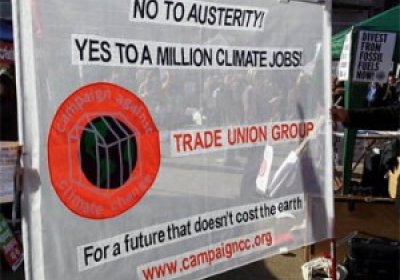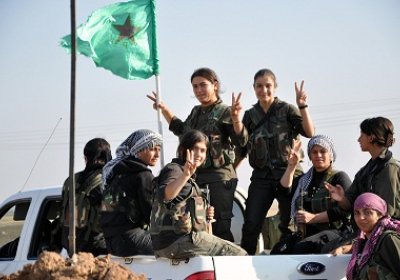Some 20,000 people marched through central London on Saturday, in the Time to Act! protest, demanding that climate change be taken seriously by political parties in the coming General Election.
Time to Act!, launched by the Campaign Against Climate Change, brought together a wide coalition of environmental and left wing organisations.
The march was young, vibrant and diverse: placards from the Greens, Socialist Worker and Left Unity mixed with banners and flags from Friends of the Earth, Greenpeace, the Peoples’ Assembly and trade unions.
Democracy
A largely unknown region to the rest of the world became one of the most talked about globally in recent months.
Kobane is a town that suffered a too-harsh fate. Innocent civilians never think that one day they would face massacres — except that being a Kurd in a town like Kobane (in a largely Kurdish area in the north-west of the Syrian state), means you face such things.
In response to US President Barack Obama’s use of an executive order to sanction Venezuelan authorities, Venezuelan President Nicolas Maduro requested decree powers to pass an “anti-imperialist law to prepare for all scenarios”. On March 11, a majority of Venezuela's National Assembly voted in favour. The bill, which must be approved by 60% of the Assembly according to Venezuela’s constitution, will now move on to a second reading to obtain final approval.
Refugees on Nauru have defied government and police attempts to ban protesting, as the United Nations adds to the growing body of evidence that Australia's asylum policy is violating human rights.
The Refugee Action Coalition (RAC) said 300 refugees held a peaceful protest on March 11, “just one week after Nauruan police staged mass arrests on the island in a bid to stifle the campaign of non-cooperation being waged by the refugees”.
Tamil women whose relatives are missing completed a three-day hunger strike at Nalloor, a town in the north of Sri Lanka, on March 8.
The women, led by Northern Provincial Council member Ananthy Sasitharan, were demanding an international investigation into the disappearance of their relatives, who were arrested or abducted by the Sri Lankan armed forces.
The women were joined by young people who had finished a four-day march from Mullivaikkaal, site of the genocidal massacre of Tamils by the army in the final stages of the war, which ended in May 2009.
Near the heartland of New Zealand’s renowned wine country, there is a place where visitors are not allowed to go. The peculiar large white domes that protrude from the earth in the Waihopai Valley are surrounded by razor wire and shrouded in secrecy.
Western Sahara is recognised by the United Nations as the last non-self-governing territory in Africa. Between 1973 and 1991 it was at war, as the pro-independence Polisario Front fought first against colonial rulers Spain, and after 1975, against Morocco, which invaded with Spanish encouragement.
In 1991, a United Nations-sponsored ceasefire was supposed to bring peace, based on a referendum on independence. However, the UN-promised referendum has never been held. Overt support from France, and more tacit support from the US, has enabled Morocco to have it indefinitely postponed.
What does the victory of radical left party SYRIZA in Greece's January 25 elections mean for politics in Europe, at Europe-wide and national levels? Both levels are closely intertwined, and since SYRIZA’s win have been having rapid feedback effects on each another.
Across Europe, the reverberations of SYRIZA’s win are being felt with rising force, both in “peripheral” Europe, but also in the German-led European Union “core”.
About 10,000 people took part in a peaceful demonstration in Kuala Lumpur on March 7 against the jailing of opposition leader Anwar Ibrahim, Malaysian Socialist Party (PSM) leader S. Arutchelvan (Arul) told Green Left Weekly. Anwar was jailed for a second time on trumped up “sodomy” charges.
The protest was called by a new coalition called KitaLawan (“We Fightback”). Authorities responded by arresting Nik Nazmi, the youth leader of the opposition Justice Party (PKR), and Saifullah Zulkifli, a PKR organiser.
Union of South American Nations (UNASUR) secretary-general Ernesto Samper, said on March 9 that the regional bloc offered total support to the government of Venezuelan President Nicolas Maduro after the US government’s declaration of Venezuela as a national security threat.
US President Barack Obama has issued a decree listing Venezuela as a “national security emergency” for the US, citing alleged human rights abuses and corruption. The US has also imposed extra sanctions on several Venezuelan officials.
US President Barack Obama issued an Executive Order regarding Venezuela on March 9 that escalated US attacks on Venezuela's left-wing government.
The order amounts to an act of aggression against Venezuela's sovereignty by declaring a “national emergency” based on claims the oil-rich South American nation threatens US national security due to alleged human rights violations and corruption.
The Bolivarian Alliance of the Peoples of Our America (ALBA) is an anti-imperialist trading bloc first formed by the left-wing governments of Venezuela and Cuba to promote trade on the basis of solidarity rather than competition.
It has since expanded to include 11 nations, with Venezuela and Cuba joined by Bolivia, Ecuador, Nicaragua, Dominica, Antigua and Barbuda, St Vincent and the Grenadines, Saint Lucia, Grenada and Saint Kitts and Nevis. Honduras was an ALBA member, but was forced to withdraw when a 2009 US-backed coup installed a right-wing dictatorship.
- Previous page
- Page 317
- Next page










